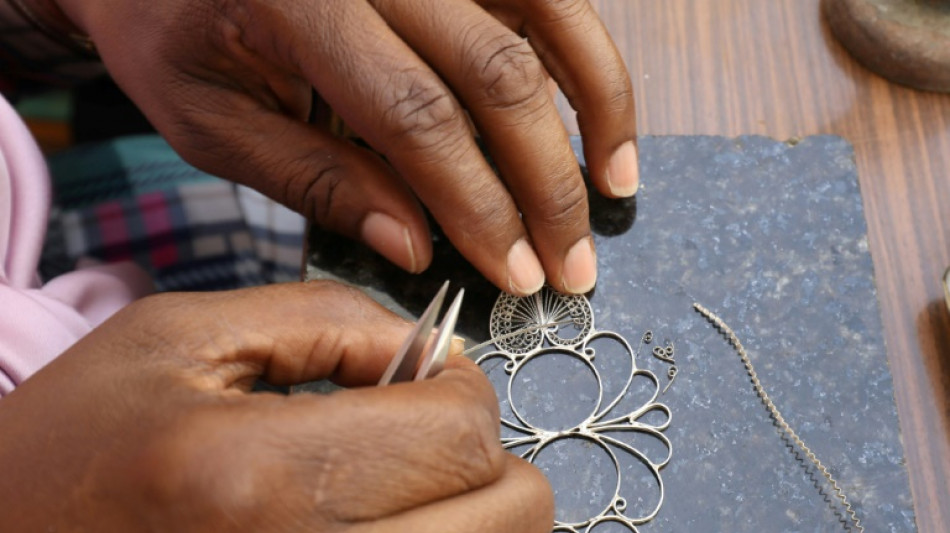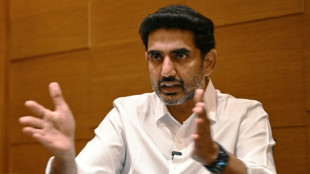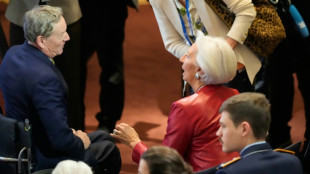
-
 Interpol backroom warriors fight cyber criminals 'weaponising' AI
Interpol backroom warriors fight cyber criminals 'weaponising' AI
-
New world for users and brands as ads hit AI chatbots

-
 Japan's 'godless' lake warns of creeping climate change
Japan's 'godless' lake warns of creeping climate change
-
US teen Lutkenhaus breaks world junior indoor 800m record

-
 World copper rush promises new riches for Zambia
World copper rush promises new riches for Zambia
-
Paw patrol: Larry the cat marks 15 years at 10 Downing Street

-
 India plans AI 'data city' on staggering scale
India plans AI 'data city' on staggering scale
-
Jamaica's Thompson-Herah runs first race since 2024

-
 Top seed Fritz to face Shelton for ATP Dallas Open title
Top seed Fritz to face Shelton for ATP Dallas Open title
-
Crash course: Vietnam's crypto boom goes bust

-
 Ahead of Oscars, Juliette Binoche hails strength of Cannes winners
Ahead of Oscars, Juliette Binoche hails strength of Cannes winners
-
US cattle farmers caught between high costs and weary consumers

-
 New York creatives squeezed out by high cost of living
New York creatives squeezed out by high cost of living
-
Lillard matches NBA 3-point contest mark in injury return

-
 NBA mulling 'every possible remedy' as 'tanking' worsens
NBA mulling 'every possible remedy' as 'tanking' worsens
-
Team USA men see off dogged Denmark in Olympic ice hockey

-
 'US-versus-World' All-Star Game divides NBA players
'US-versus-World' All-Star Game divides NBA players
-
Top seed Fritz beats Cilic to reach ATP Dallas Open final

-
 China's freeski star Gu recovers from crash to soar into Olympic big air final
China's freeski star Gu recovers from crash to soar into Olympic big air final
-
Braathen wins unique Winter Olympic gold for Brazil, Gu overcomes scare

-
 Lens run riot to reclaim top spot in Ligue 1, Marseille slip up
Lens run riot to reclaim top spot in Ligue 1, Marseille slip up
-
Last-gasp Zielinski effort keeps Inter at Serie A summit

-
 Vinicius bags brace as Real Madrid take Liga lead, end Sociedad run
Vinicius bags brace as Real Madrid take Liga lead, end Sociedad run
-
Liverpool beat Brighton, Man City oust Beckham's Salford from FA Cup

-
 International crew arrives at space station
International crew arrives at space station
-
Australia celebrate best-ever Winter Olympics after Anthony wins dual moguls

-
 Townsend becomes a fan again as Scotland stun England in Six Nations
Townsend becomes a fan again as Scotland stun England in Six Nations
-
France's Macron urges calm after right-wing youth fatally beaten

-
 China's freeski star Gu recovers from crash to reach Olympic big air final
China's freeski star Gu recovers from crash to reach Olympic big air final
-
Charli XCX 'honoured' to be at 'political' Berlin Film Festival

-
 Relatives of Venezuela political prisoners begin hunger strike
Relatives of Venezuela political prisoners begin hunger strike
-
Trump's 'desire' to own Greenland persists: Danish PM

-
 European debate over nuclear weapons gains pace
European debate over nuclear weapons gains pace
-
Newcastle oust 10-man Villa from FA Cup, Man City beat Beckham's Salford

-
 Auger-Aliassime swats aside Bublik to power into Rotterdam final
Auger-Aliassime swats aside Bublik to power into Rotterdam final
-
French prosecutors announce special team for Epstein files

-
 Tuipulotu 'beyond proud' as Scotland stun England
Tuipulotu 'beyond proud' as Scotland stun England
-
Jones strikes twice as Scotland end England's unbeaten run in style

-
 American Stolz wins second Olympic gold in speed skating
American Stolz wins second Olympic gold in speed skating
-
Marseille start life after De Zerbi with Strasbourg draw

-
 ECB to extend euro backstop to boost currency's global role
ECB to extend euro backstop to boost currency's global role
-
Canada warned after 'F-bomb' Olympics curling exchange with Sweden

-
 Ultra-wealthy behaving badly in surreal Berlin premiere
Ultra-wealthy behaving badly in surreal Berlin premiere
-
250,000 at rally in Germany demand 'game over' for Iran's leaders

-
 UK to deploy aircraft carrier group to Arctic this year: PM
UK to deploy aircraft carrier group to Arctic this year: PM
-
Zelensky labels Putin a 'slave to war'

-
 Resurgent Muchova beats Mboko in Qatar final to end title drought
Resurgent Muchova beats Mboko in Qatar final to end title drought
-
Russia's Navalny poisoned with dart frog toxin: European states

-
 Farrell hails Ireland's 'unbelievable character' in edgy Six Nations win
Farrell hails Ireland's 'unbelievable character' in edgy Six Nations win
-
Markram, Jansen lead South Africa to brink of T20 Super Eights


Libya traditional jewellery hangs on by silver thread
In Tripoli's Old City, young Libyans weave delicate patterns with threads of silver and gold to create traditional filigree jewellery -- reviving an art almost lost through decades of dictatorship and war.
Abdelmajid Zeglam is just 12 years old, but his minutely detailed creations are already selling fast in the streets around a Roman-era archway dedicated to emperor Marcus Aurelius.
"I hesitated at first for fear of failing because I'm young, but my mum encouraged me," Zeglam said.
He is the youngest of 20 or so students, around half of them female, studying at the Libyan Academy for Traditional Gold and Silver Crafts, in a building that once served as a French consulate to the Ottoman Empire.
Trainees learn about precious metal alloys before studying the art of filigree, in which beads and threads of the precious materials are woven into intricate designs then soldered together to create jewellery.
"I love it," Zeglam said. "I want to become a petroleum engineer in the mornings and a jeweller in the afternoons."
Mohamed al-Miloudi, a 22-year-old civil engineering student in a baseball cap, said he had not missed a class since signing up in September.
"It's a hobby, but I'd like to make it into my trade," he said.
The institute's founder, Abdelnasser Aboughress, said filigree jewellery was an ancient tradition in the North African country.
"Craftsmen in the medina of Tripoli were trained by Jewish masters and later by Arabs, at the prestigious School of Arts and Trades" founded in the late 19th century, he said.
- Secret jewellers -
But generations of tradition were abruptly halted after Moamer Kadhafi took power in a 1969 coup.
The capricious ruler scrapped the constitution and established his "jamahiriya" -- a medley of socialism, Arab nationalism and tribal patronage.
He also scrapped the private sector, seizing companies and confiscating their assets.
Overnight, self-employed artisans lost everything: their workshops, their livelihoods and their students.
"The state reduced Libyan crafts to nothing and forced a generation of young apprentices, who should have taken up the baton, to instead leave the traditional crafts and join the army" or become civil servants, said Aboughress.
The 55-year-old was born just a few streets away in the medina, and despite Kadhafi's ban, he took up the craft at the age of 15.
Along with his father, for decades he worked in secret on jewellery for trusted clients.
Now, he hopes to pass the craft on to younger generations, as well as fighting back against a tide of "lower-quality jewellery imported from Egypt and China (which) has flooded the market".
Aboughress is working on a project to document and preserve as much of this cultural heritage as possible.
- 'People with passion' -
Student Fatima Boussoua hit out at the practice of selling old Libyan silver jewellery at cheap prices to be exported then melted down.
"It's part of Libya's artisanal heritage that's disappearing!" she said.
A dentist in her 40s who also teaches at the University of Tripoli, Boussoua has been training at the centre for the past year, hoping to master the craft.
"We should be training artists to preserve our heritage," she said. "All it needs is people with passion."
While becoming a true expert takes years of training, Aboughress's students are already producing works for sale online or at the centre itself.
That said, he admits the project needs financial help to buy the expensive raw materials -- as well as "moral support".
He hopes that with enough resources, he will one day be able to set up a string of other workshops across Libya.
"It's time to bring this craft back to life," he said.
Z.AbuSaud--SF-PST

